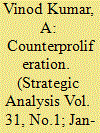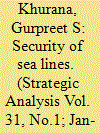|
|
|
Sort Order |
|
|
|
Items / Page
|
|
|
|
|
|
|
| Srl | Item |
| 1 |
ID:
077437


|
|
|
|
|
| Publication |
2007.
|
| Summary/Abstract |
Both India and Japan have evinced interest in deploying defences against ballistic missiles because of the threat they pose. Significantly, both have shifted their stance on US Ballistic Missile Defence (BMD), from previous opposition to active support. Notwithstanding certain basic differences between India and Japan on the nature and degree of interest and participation at present, shared interests offer an opportunity for them to cooperate with each other on the BMD issue to further consolidate the 'strategic partnership' understanding they have evolved. Since Japan is already actively collaborating with the United States in not only deploying BMDs but also co-developing certain critical components, and India actively weighing various options, including cooperation with the United States, in this field, it may become imperative for India and Japan to cooperate once India takes a firm decision on BMD deployment. Apart from common concerns about proliferation of weapons of mass destruction and missiles, in particular the clandestine deals between North Korea and Pakistan, the strategic relations between the two countries have so far been focused on the maritime cooperation. Joint work on missile defence could become a new dimension of bilateral relationship and help co-development of advanced technologies
|
|
|
|
|
|
|
|
|
|
|
|
|
|
|
|
| 2 |
ID:
077431


|
|
|
|
|
| Publication |
2007.
|
| Summary/Abstract |
Despite its excellent record in the field of non-proliferation of technologies, know-how and equipment related to weapons of mass destruction (WMD) to other states, India has been essentially a passive actor in global non-proliferation initiatives. As a result, it does not as yet have a comprehensive framework or strategy within which it defines its anti-proliferation objectives. The Indo-US nuclear agreement of July 2005, with non-proliferation as an important component of cooperation, has given an opportunity to India to debate and prepare its approach for involvement in this crucial field. Since the early 1990s, the United States has promoted counter proliferation as a strategy to tackle proliferation of WMD as well as augment capabilities to operate in a nuclear, biological and chemical environment. However, after the 9/11 attacks, this strategy has attained a new character, represented by new initiatives that advocate methods such as military interdiction and coercive action to tackle proliferation and terrorism. Although the effectiveness of these initiatives is debatable, they have now widened the scope of mechanisms and regimes created to deal with perceived and emergent threats. Despite its reservations on many components of US-promoted initiatives, India may have to consider in the near future the feasibility of using diplomatic and military tools to tackle the proliferation problem in its neighbourhood, especially if it is tied to terrorism. While examining prospects of an Indian anti-proliferation strategy, a key question would be to what extent India should cooperate with new US initiatives
|
|
|
|
|
|
|
|
|
|
|
|
|
|
|
|
| 3 |
ID:
077435


|
|
|
|
|
| Publication |
2007.
|
| Summary/Abstract |
Contemporary Japanese nationalism is the principal force behind Japan's gradual shift towards 'normal' statehood and what has been called as 'reluctant realism'. The nature and content of this nationalism is, however, very much dissimilar to that which characterized its militarist past. This nationalist streak is largely elitist and assumes softer undertones as it percolates down to the masses. The article argues that contemporary assertive Japanese nationalism is the force behind Tokyo's quest for a redefinition of its national identity befitting its international status and global role
|
|
|
|
|
|
|
|
|
|
|
|
|
|
|
|
| 4 |
ID:
077433


|
|
|
|
|
| Publication |
2007.
|
| Summary/Abstract |
With the North Atlantic Treaty Organisation (NATO) taking over command from the US-led Coalition Forces in southern Afghanistan and the United States focusing on the eastern part of Afghanistan, particularly along the border with Pakistan, crucial questions have arisen regarding securing Afghanistan and its transition to democracy. How will NATO perform its new responsibilities and what will be its counter-terrorism strategies? Will it be substantially different from the US counter-terrorism approach and how will the differences on the issue of 'use of force' among the NATO members be reconciled? These are some of the questions that this article addresses in the broader context of NATO's transformation from its earlier 'support role' to now that of a 'lead role'.
|
|
|
|
|
|
|
|
|
|
|
|
|
|
|
|
| 5 |
ID:
077436


|
|
|
|
|
| Publication |
2007.
|
| Summary/Abstract |
Ensuring access to crude oil and natural gas forms a crucial component of India's security calculus. It also critically underlines the significance of sea transportation through which much of these vital resources are traded. With India virtually insular in terms of its land communications, its trade interests are increasingly focused on the maritime domain. Its vital interests in the security of sea routes at the same time are beginning to converge with those of Japan, the economic powerhouse of Asia, which being an island state is critically dependent on Pacific and Indian Ocean 'maritime lifelines' not only for its energy imports but also for much of its food and other vital resource supplies. As the Indian economy grows, the strategic congruence between the two states is likely to strengthen because of two factors; first, the growing Asian economic integration, and second, the geographic locations of India and Japan vis-à-vis the global distribution of potential sources of strategic commodities
|
|
|
|
|
|
|
|
|
|
|
|
|
|
|
|
| 6 |
ID:
077430


|
|
|
|
|
| Publication |
2007.
|
| Summary/Abstract |
For decades, the dominant sense in the foreign policy establishment of India was that neither the Kashmir question nor the boundary dispute with China was ripe for resolution. Yet, in defiance of this received wisdom, two very different political coalitions have opened and sustained substantive negotiations on Jammu and Kashmir and the boundary dispute with China. Forward movement in both negotiations has also been premised on opening the closed frontiers with China and Pakistan. This development in India's foreign and national security policy is consequential since the resolution of either of these disputes or both could alter the territorial map of India. If the new arrangements work, they would also significantly alter the nature of India's frontiers with two of its long-standing rivals, Pakistan and China. In the strategic realm, success on either front has the potential to transform India's security condition
|
|
|
|
|
|
|
|
|
|
|
|
|
|
|
|
| 7 |
ID:
077434


|
|
|
|
|
| Publication |
2007.
|
| Summary/Abstract |
India's interest in Sudan has grown significantly in recent years. This is reflected in India's increased trade and investments in Sudan. Two factors that have generated such interest and encouraged Indian engagement are the signing of the Comprehensive Peace Agreement in January 2005 and the soaring economy. However, delay in the implementation of the peace deal and conflict in western and eastern Sudan pose serious challenges to the huge Indian interest. This paper examines India's role and interest in the context of the ongoing crisis in Sudan. It argues that lack of democracy and good governance has perpetuated the conflict and made peace unsustainable. Prolongation of such a situation is not in India's interest given its economic and energy stakes in Sudan. A prudent and proactive role on the part of India is necessary in order to address Sudan's concerns and challenges and thereby advance its growing interests in Sudan and Africa
|
|
|
|
|
|
|
|
|
|
|
|
|
|
|
|
| 8 |
ID:
077432


|
|
|
|
|
| Publication |
2007.
|
| Summary/Abstract |
In the immediate aftermath of the Second Israel-Lebanon War, most observers have concluded that Israel lost its war against Hezbollah. Although at the end of 34 days of violent engagement there is no clear victor or loser, this article, on the contrary, argues that Israel succeeded in achieving the most important among its political and strategic objectives
|
|
|
|
|
|
|
|
|
|
|
|
|
|
|
|
|
|
|
|
|